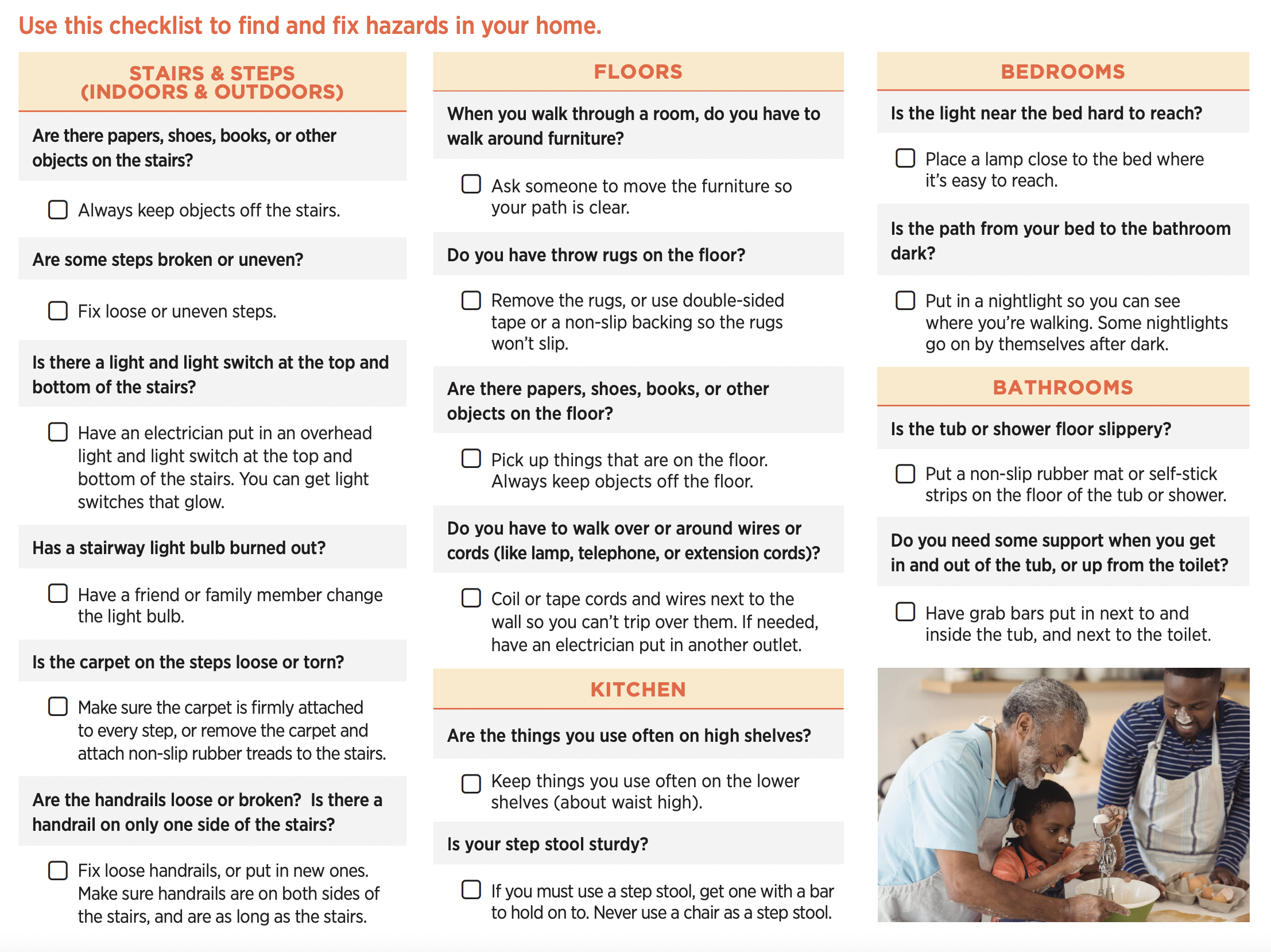A Biased View of Dementia Fall Risk
A Biased View of Dementia Fall Risk
Blog Article
The Facts About Dementia Fall Risk Uncovered
Table of ContentsThe Buzz on Dementia Fall RiskDementia Fall Risk Fundamentals ExplainedMore About Dementia Fall RiskThe Facts About Dementia Fall Risk Uncovered
An autumn threat evaluation checks to see how most likely it is that you will certainly fall. It is mainly provided for older grownups. The assessment typically includes: This consists of a collection of concerns regarding your total wellness and if you've had previous falls or issues with equilibrium, standing, and/or strolling. These tools check your strength, equilibrium, and gait (the way you walk).Interventions are suggestions that may reduce your risk of dropping. STEADI consists of three steps: you for your threat of falling for your risk variables that can be improved to attempt to prevent drops (for instance, equilibrium troubles, impaired vision) to minimize your risk of dropping by using reliable techniques (for example, giving education and learning and sources), you may be asked numerous inquiries including: Have you fallen in the past year? Are you worried concerning dropping?
You'll sit down again. Your company will certainly check how long it takes you to do this. If it takes you 12 secs or more, it may imply you go to greater danger for a loss. This examination checks strength and equilibrium. You'll rest in a chair with your arms crossed over your breast.
Move one foot midway ahead, so the instep is touching the huge toe of your other foot. Move one foot totally in front of the other, so the toes are touching the heel of your various other foot.
Dementia Fall Risk Things To Know Before You Buy
The majority of drops happen as an outcome of multiple adding elements; consequently, managing the threat of dropping begins with recognizing the aspects that contribute to fall danger - Dementia Fall Risk. Several of the most appropriate threat aspects consist of: Background of prior fallsChronic medical conditionsAcute illnessImpaired stride and balance, reduced extremity weaknessCognitive impairmentChanges in visionCertain risky medications and polypharmacyEnvironmental aspects can likewise increase the risk for drops, consisting of: Poor lightingUneven or harmed flooringWet or slippery floorsMissing or harmed hand rails and get barsDamaged or improperly fitted equipment, such as beds, mobility devices, or walkersImproper use assistive devicesInadequate supervision of individuals living in the NF, including those that exhibit hostile behaviorsA effective autumn risk management program calls for an extensive clinical analysis, with input from all participants of the interdisciplinary group

The care plan ought to also include interventions that are system-based, such as those that advertise a secure atmosphere (proper illumination, hand rails, grab bars, etc). The efficiency of the treatments should be reviewed regularly, and the treatment strategy modified as needed to show changes in the fall danger assessment. Carrying out an autumn danger administration system utilizing evidence-based ideal practice can lower the occurrence of falls in the NF, while restricting the possibility for fall-related injuries.
The Greatest Guide To Dementia Fall Risk
The AGS/BGS guideline advises evaluating all check my site grownups aged 65 years and older for loss risk every year. This testing includes asking patients whether they have dropped 2 or even more times in the past year or sought medical focus for a fall, or, if they have not dropped, whether they feel unsteady when strolling.
People who have actually dropped when without injury ought to have their equilibrium and gait evaluated; those with stride or balance irregularities ought to get extra analysis. A history of 1 autumn without injury and without stride or equilibrium problems does not call for further assessment past continued annual fall risk testing. Dementia Fall Risk. A fall risk assessment is required as part of click resources the Welcome to Medicare exam

8 Simple Techniques For Dementia Fall Risk
Documenting a drops history is just one of the top quality indications for fall prevention and management. An essential part of danger analysis is a medication evaluation. A number of courses of medications boost fall threat (Table 2). Psychoactive medications in certain are independent predictors of falls. These drugs often tend to be sedating, modify the sensorium, and hinder balance and stride.
Postural hypotension can frequently be alleviated by minimizing the dose of blood pressurelowering medicines and/or quiting drugs that have orthostatic hypotension as an adverse effects. Use above-the-knee assistance hose pipe and copulating the head of the bed raised might likewise lower postural decreases in blood pressure. The suggested aspects of a fall-focused health examination are received Box 1.

A yank time above or equal to 12 secs recommends high autumn risk. The 30-Second Chair Stand test assesses lower extremity toughness and balance. Being not able to stand up from a chair of knee height without utilizing one's arms shows enhanced loss risk. The 4-Stage Equilibrium examination examines static equilibrium by having the patient stand in 4 settings, each considerably extra challenging.
Report this page